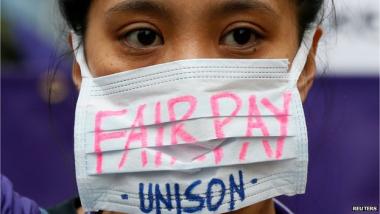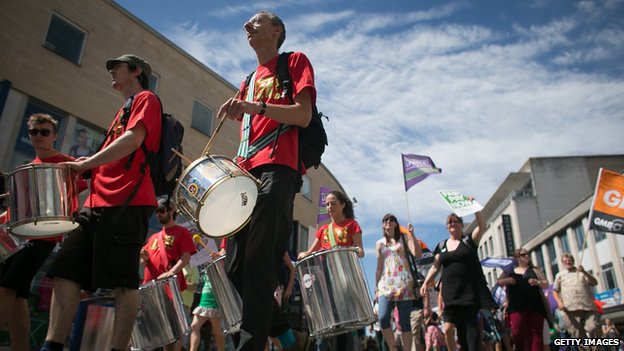
Hundreds of thousands of people have taken part in rallies and marches across the UK as part of a day of strike action by public service unions.
Teachers, firefighters and council workers joined the strike, which follows disputes with the government over pay, pensions and cuts.
Thousands of pupils were affected as some 6,000 schools in England closed, the Department for Education said.
The Cabinet Office described the action as "irresponsible".
But Trades Union Congress (TUC) general secretary Frances O'Grady said workers had gone on strike "to say enough is enough".
The GMB and Unison unions said more than one million people had taken part in the strikes.
But Cabinet Office Minister Francis Maude said fewer than 500,000 had participated.
And a government spokesman said "most" public sector workers had reported for work and "nearly all key public services" were delivered as normal.
Disruption across the UK included:
- Some 21% of schools in England were closed, according to the Department for Education. In Wales, 912 schools were closed with 215 others reporting disruption
- Museums closed in Edinburgh, Nottingham and Leicester, many libraries were closed, and bin collections were halted in Derby
- Some airports - including Heathrow and Luton - warned passengers about possible delays due to border control staff striking
- A spokesman said 919 Scottish government staff were taking part in industrial action - just over 12% of the workforce
- In Northern Ireland, Belfast Zoo, leisure centres, public toilets, recycling centres and civic amenity sitesclosed
- In Wales, all business at the Welsh assembly was cancelled, the DVLA centre in Swansea warned of delays, while the National Museum in Cardiff closed

At the scene
Sophie Hutchinson at Trafalgar Square
Several thousand demonstrators have marched down London's Regent Street chanting and waving their different coloured banners to a rally in Trafalgar Square.
Workers from right across the public sector are here. They are members of more than six different public sector unions, representing teachers, civil servants, NHS staff, local council employees and firefighters.
All of them are braving the spitting rain and determined to take part in what they insist is their legal right to protest.
The complaint that unites most is over pay. Chants of "fair pay" can be heard from the crowd and the rally began with calls for a living wage, which was met with great applause.
These public sector workers claim that they are not seeing any benefit from a recovering economy and that the pay freeze and 1% cap on a rise which they've seen in the last four years, has left them £4,000 worse off than in 2010.
The mood of this protest is good-tempered and relatively upbeat but the demonstrators' message to ministers shows their growing resentment and frustration.

